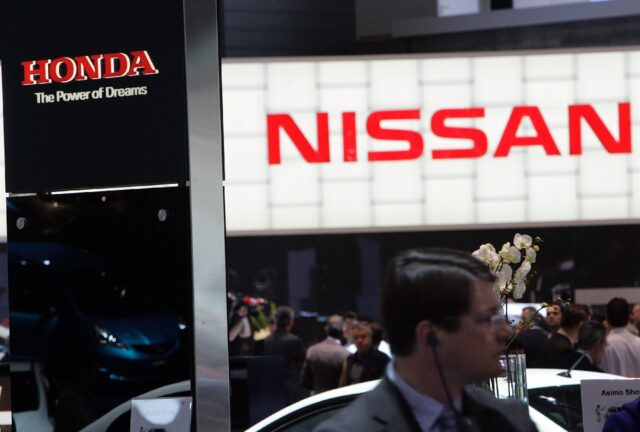Japanese auto giants Honda and Nissan are in preliminary merger talks to help them compete against Tesla and Chinese electric vehicle makers, media reports said Wednesday.
Shares in Nissan soared as much as 24 percent, while Honda dipped more three percent. Mitsubishi Motors — of which Nissan is the top shareholder — gained almost 20 percent.
Japan’s number two and three automakers behind Toyota had already agreed in March to explore a strategic partnership on EVs.
“We are discussing possibilities for cooperation… in a wide range of fields and in various areas, and those possibilities include the latest reports, but there is nothing decided,” a Honda spokesman told AFP on Wednesday.
Nissan said: “The content of the report is not something that has been announced by either company… If there are any updates, we will inform our stakeholders at the appropriate time.”
Major automakers the world over have been reeling from tough competition in EVs, in particular from Chinese competitors such as BYD.
Volkswagen, for instance, is considering closing German factories for the first time in its history.
Last month, Nissan announced 9,000 job cuts, slashed its sales forecasts and said it would reduce global production capacity by 20 percent.
Warning of a “severe situation”, CEO Makoto Uchida said he would forfeit half his salary.
Nissan has seen a turbulent decade that included an attempted major alliance with France’s Renault that saw its former boss Carlos Ghosn arrested in 2018.
In Paris, shares in Renault, which owns a significant stake in Nissan, soared more than six percent on Wednesday.
Electric race
Bloomberg reported that an approach by Taiwan’s Foxconn — officially known as Hon Hai Precision Industry — to take a controlling stake in Nissan accelerated discussions with Honda.
Foxconn, the world’s largest contract electronics manufacturer including for Apple, was not immediately available for comment.
Honda and Nissan are considering operating under a holding company and will soon sign a memorandum of understanding, the Nikkei reported.
Their respective stakes, as well as other details, will be decided later, and they also look to eventually bring Mitsubishi Motors under the holding company, the paper said.
The Financial Times reported that the exploratory talks about a merger were at an early stage.
There are, however, concerns about a possible political backlash since a merger could result in significant job cuts, the FT reported.
Japanese television channel TBS reported that the companies could make an announcement as early as Monday.
Honda is considering several options including a merger, capital tie-up or the establishment of a holding company, executive vice president Shinji Aoyama told Bloomberg.
Overtaken
China overtook Japan as the world’s biggest vehicle exporter in 2023, helped by its dominance in EVs, a sector where Japanese firms have lost ground by focusing on hybrid vehicles.
Honda announced plans in May to double investment in electric vehicles to $65 billion by 2030, part of its ambitious target set three years ago of achieving 100 percent EV sales by 2040.
Nissan has signalled similar ambitions.
It said in March that 16 of the 30 new models it plans to launch over the next three years would be “electrified”.
The world’s auto giants are increasingly prioritising electric and hybrid vehicles, with demand growing for less polluting models as concern about climate change grows.
At the same time, however, there has been a slowdown in the EV market on the back of consumer concern about high prices, reliability, range and a lack of charging points.
“From Nissan’s perspective, the possible merger would provide short-term relief for Nissan, which is under significant financial pressure,” Tatsuo Yoshida, Bloomberg Intelligence analyst, told AFP.
“From Honda’s perspective, Honda is performing better financially, the benefits for Honda would be more long-term,” Yoshida said, adding, however, that agreeing on a deal would be “very difficult”.
burs-stu/mtp

COMMENTS
Please let us know if you're having issues with commenting.